Reflective Essay: First Peoples Health and Practice (3121MED)
VerifiedAdded on 2022/10/06
|10
|2960
|15
Essay
AI Summary
This essay is a critical reflection on the First Peoples Health and Practice course (3121MED), focusing on the student's personal journey and understanding of cultural humility within the context of Aboriginal and Torres Strait Islander healthcare. The student initially approached the course with preconceived notions, but through the coursework, they gained insights into the historical and ongoing challenges faced by First Peoples in accessing equitable healthcare. The essay explores the impact of cultural differences, discrimination, and the importance of cultural competence among healthcare professionals, particularly nurses. The student reflects on their evolving perspectives, acknowledging the need for improved cultural linking, safety, and humility in providing care. The essay also highlights the importance of health literacy, advocacy, and the implementation of patient-centered and evidence-based practices to address healthcare disparities and improve health outcomes for First Peoples communities. The student concludes by emphasizing the need for continuous learning and skill development to provide culturally safe and equitable care.
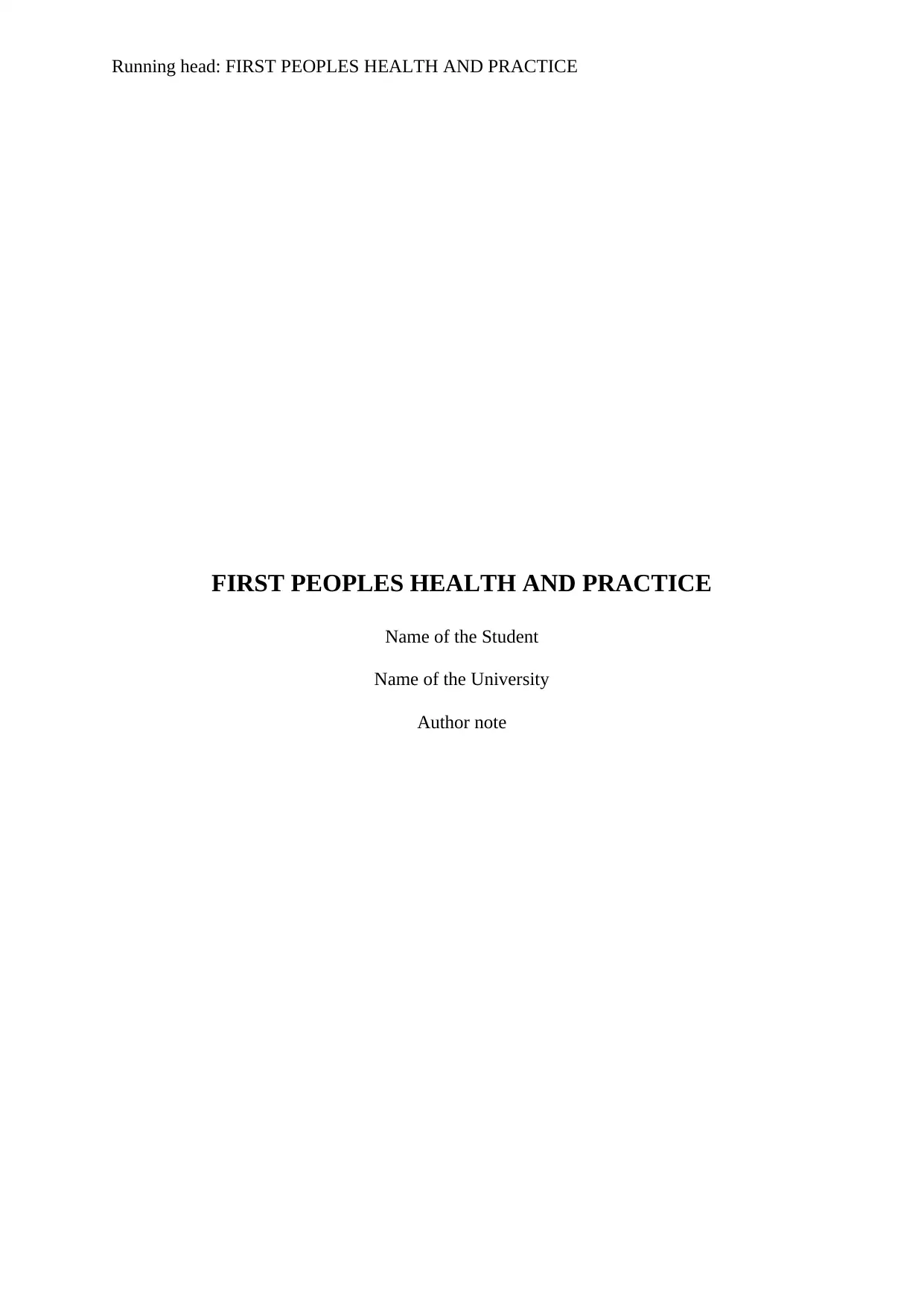
Running head: FIRST PEOPLES HEALTH AND PRACTICE
FIRST PEOPLES HEALTH AND PRACTICE
Name of the Student
Name of the University
Author note
FIRST PEOPLES HEALTH AND PRACTICE
Name of the Student
Name of the University
Author note
Paraphrase This Document
Need a fresh take? Get an instant paraphrase of this document with our AI Paraphraser
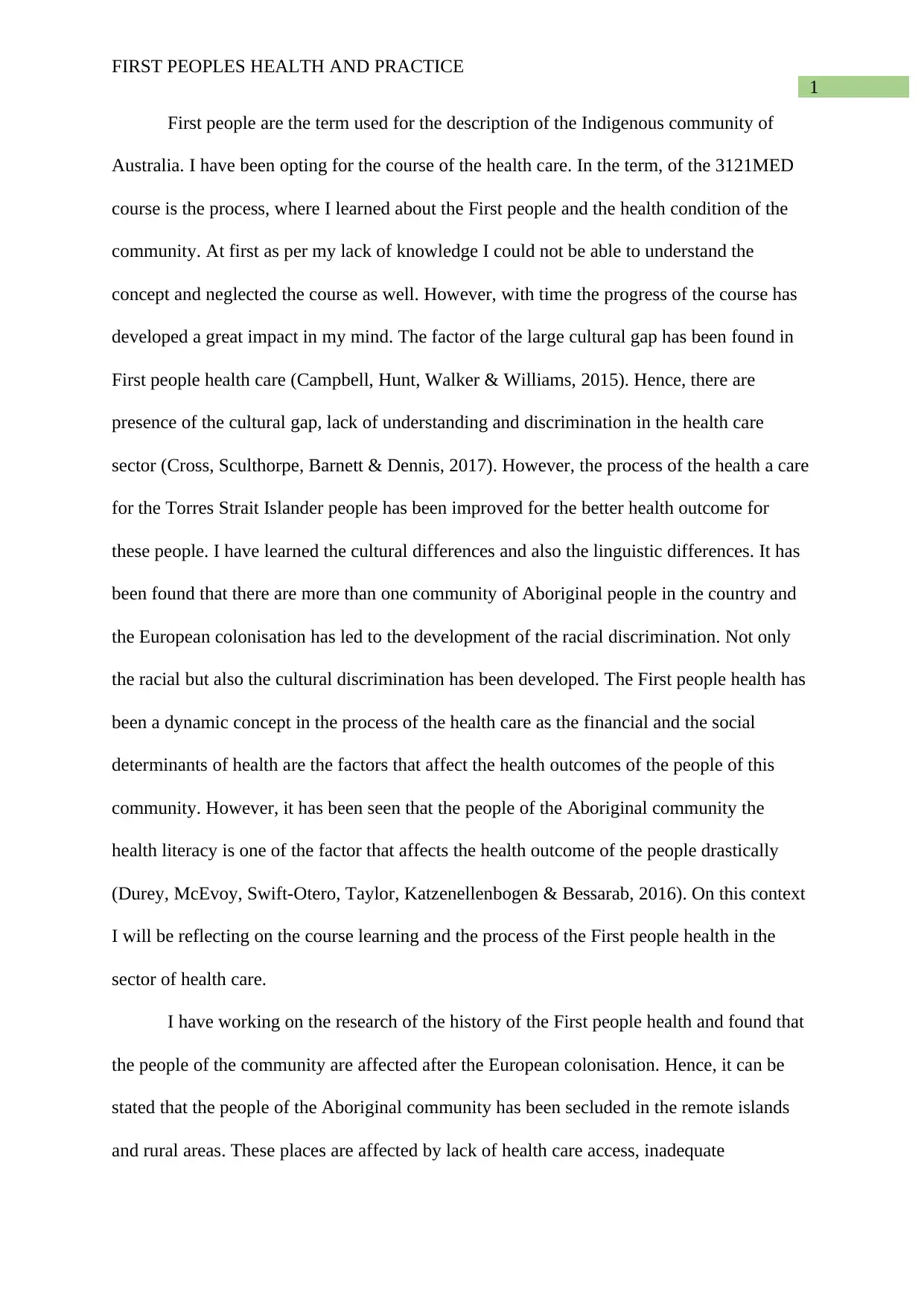
1
FIRST PEOPLES HEALTH AND PRACTICE
First people are the term used for the description of the Indigenous community of
Australia. I have been opting for the course of the health care. In the term, of the 3121MED
course is the process, where I learned about the First people and the health condition of the
community. At first as per my lack of knowledge I could not be able to understand the
concept and neglected the course as well. However, with time the progress of the course has
developed a great impact in my mind. The factor of the large cultural gap has been found in
First people health care (Campbell, Hunt, Walker & Williams, 2015). Hence, there are
presence of the cultural gap, lack of understanding and discrimination in the health care
sector (Cross, Sculthorpe, Barnett & Dennis, 2017). However, the process of the health a care
for the Torres Strait Islander people has been improved for the better health outcome for
these people. I have learned the cultural differences and also the linguistic differences. It has
been found that there are more than one community of Aboriginal people in the country and
the European colonisation has led to the development of the racial discrimination. Not only
the racial but also the cultural discrimination has been developed. The First people health has
been a dynamic concept in the process of the health care as the financial and the social
determinants of health are the factors that affect the health outcomes of the people of this
community. However, it has been seen that the people of the Aboriginal community the
health literacy is one of the factor that affects the health outcome of the people drastically
(Durey, McEvoy, Swift-Otero, Taylor, Katzenellenbogen & Bessarab, 2016). On this context
I will be reflecting on the course learning and the process of the First people health in the
sector of health care.
I have working on the research of the history of the First people health and found that
the people of the community are affected after the European colonisation. Hence, it can be
stated that the people of the Aboriginal community has been secluded in the remote islands
and rural areas. These places are affected by lack of health care access, inadequate
FIRST PEOPLES HEALTH AND PRACTICE
First people are the term used for the description of the Indigenous community of
Australia. I have been opting for the course of the health care. In the term, of the 3121MED
course is the process, where I learned about the First people and the health condition of the
community. At first as per my lack of knowledge I could not be able to understand the
concept and neglected the course as well. However, with time the progress of the course has
developed a great impact in my mind. The factor of the large cultural gap has been found in
First people health care (Campbell, Hunt, Walker & Williams, 2015). Hence, there are
presence of the cultural gap, lack of understanding and discrimination in the health care
sector (Cross, Sculthorpe, Barnett & Dennis, 2017). However, the process of the health a care
for the Torres Strait Islander people has been improved for the better health outcome for
these people. I have learned the cultural differences and also the linguistic differences. It has
been found that there are more than one community of Aboriginal people in the country and
the European colonisation has led to the development of the racial discrimination. Not only
the racial but also the cultural discrimination has been developed. The First people health has
been a dynamic concept in the process of the health care as the financial and the social
determinants of health are the factors that affect the health outcomes of the people of this
community. However, it has been seen that the people of the Aboriginal community the
health literacy is one of the factor that affects the health outcome of the people drastically
(Durey, McEvoy, Swift-Otero, Taylor, Katzenellenbogen & Bessarab, 2016). On this context
I will be reflecting on the course learning and the process of the First people health in the
sector of health care.
I have working on the research of the history of the First people health and found that
the people of the community are affected after the European colonisation. Hence, it can be
stated that the people of the Aboriginal community has been secluded in the remote islands
and rural areas. These places are affected by lack of health care access, inadequate
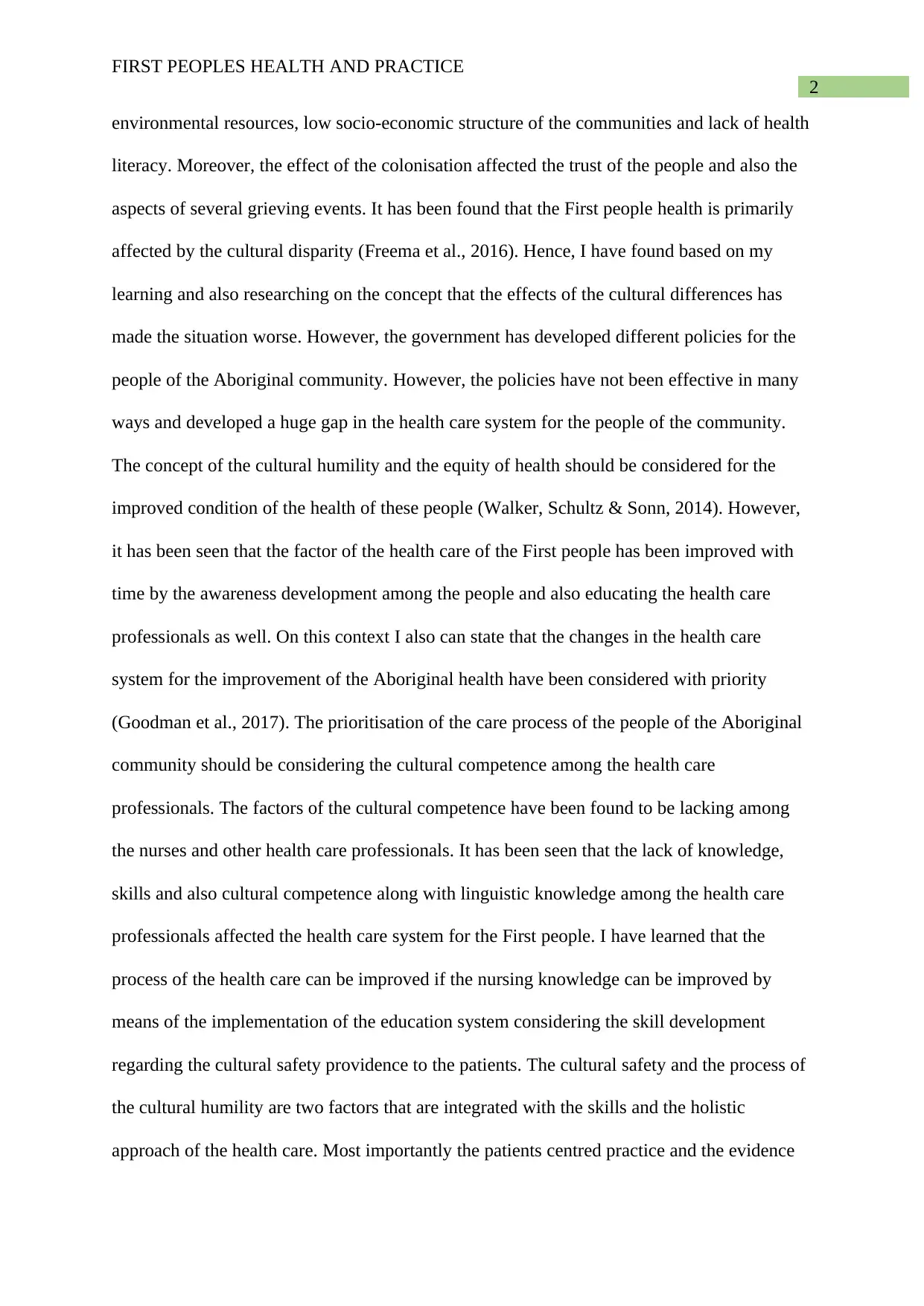
2
FIRST PEOPLES HEALTH AND PRACTICE
environmental resources, low socio-economic structure of the communities and lack of health
literacy. Moreover, the effect of the colonisation affected the trust of the people and also the
aspects of several grieving events. It has been found that the First people health is primarily
affected by the cultural disparity (Freema et al., 2016). Hence, I have found based on my
learning and also researching on the concept that the effects of the cultural differences has
made the situation worse. However, the government has developed different policies for the
people of the Aboriginal community. However, the policies have not been effective in many
ways and developed a huge gap in the health care system for the people of the community.
The concept of the cultural humility and the equity of health should be considered for the
improved condition of the health of these people (Walker, Schultz & Sonn, 2014). However,
it has been seen that the factor of the health care of the First people has been improved with
time by the awareness development among the people and also educating the health care
professionals as well. On this context I also can state that the changes in the health care
system for the improvement of the Aboriginal health have been considered with priority
(Goodman et al., 2017). The prioritisation of the care process of the people of the Aboriginal
community should be considering the cultural competence among the health care
professionals. The factors of the cultural competence have been found to be lacking among
the nurses and other health care professionals. It has been seen that the lack of knowledge,
skills and also cultural competence along with linguistic knowledge among the health care
professionals affected the health care system for the First people. I have learned that the
process of the health care can be improved if the nursing knowledge can be improved by
means of the implementation of the education system considering the skill development
regarding the cultural safety providence to the patients. The cultural safety and the process of
the cultural humility are two factors that are integrated with the skills and the holistic
approach of the health care. Most importantly the patients centred practice and the evidence
FIRST PEOPLES HEALTH AND PRACTICE
environmental resources, low socio-economic structure of the communities and lack of health
literacy. Moreover, the effect of the colonisation affected the trust of the people and also the
aspects of several grieving events. It has been found that the First people health is primarily
affected by the cultural disparity (Freema et al., 2016). Hence, I have found based on my
learning and also researching on the concept that the effects of the cultural differences has
made the situation worse. However, the government has developed different policies for the
people of the Aboriginal community. However, the policies have not been effective in many
ways and developed a huge gap in the health care system for the people of the community.
The concept of the cultural humility and the equity of health should be considered for the
improved condition of the health of these people (Walker, Schultz & Sonn, 2014). However,
it has been seen that the factor of the health care of the First people has been improved with
time by the awareness development among the people and also educating the health care
professionals as well. On this context I also can state that the changes in the health care
system for the improvement of the Aboriginal health have been considered with priority
(Goodman et al., 2017). The prioritisation of the care process of the people of the Aboriginal
community should be considering the cultural competence among the health care
professionals. The factors of the cultural competence have been found to be lacking among
the nurses and other health care professionals. It has been seen that the lack of knowledge,
skills and also cultural competence along with linguistic knowledge among the health care
professionals affected the health care system for the First people. I have learned that the
process of the health care can be improved if the nursing knowledge can be improved by
means of the implementation of the education system considering the skill development
regarding the cultural safety providence to the patients. The cultural safety and the process of
the cultural humility are two factors that are integrated with the skills and the holistic
approach of the health care. Most importantly the patients centred practice and the evidence
⊘ This is a preview!⊘
Do you want full access?
Subscribe today to unlock all pages.

Trusted by 1+ million students worldwide
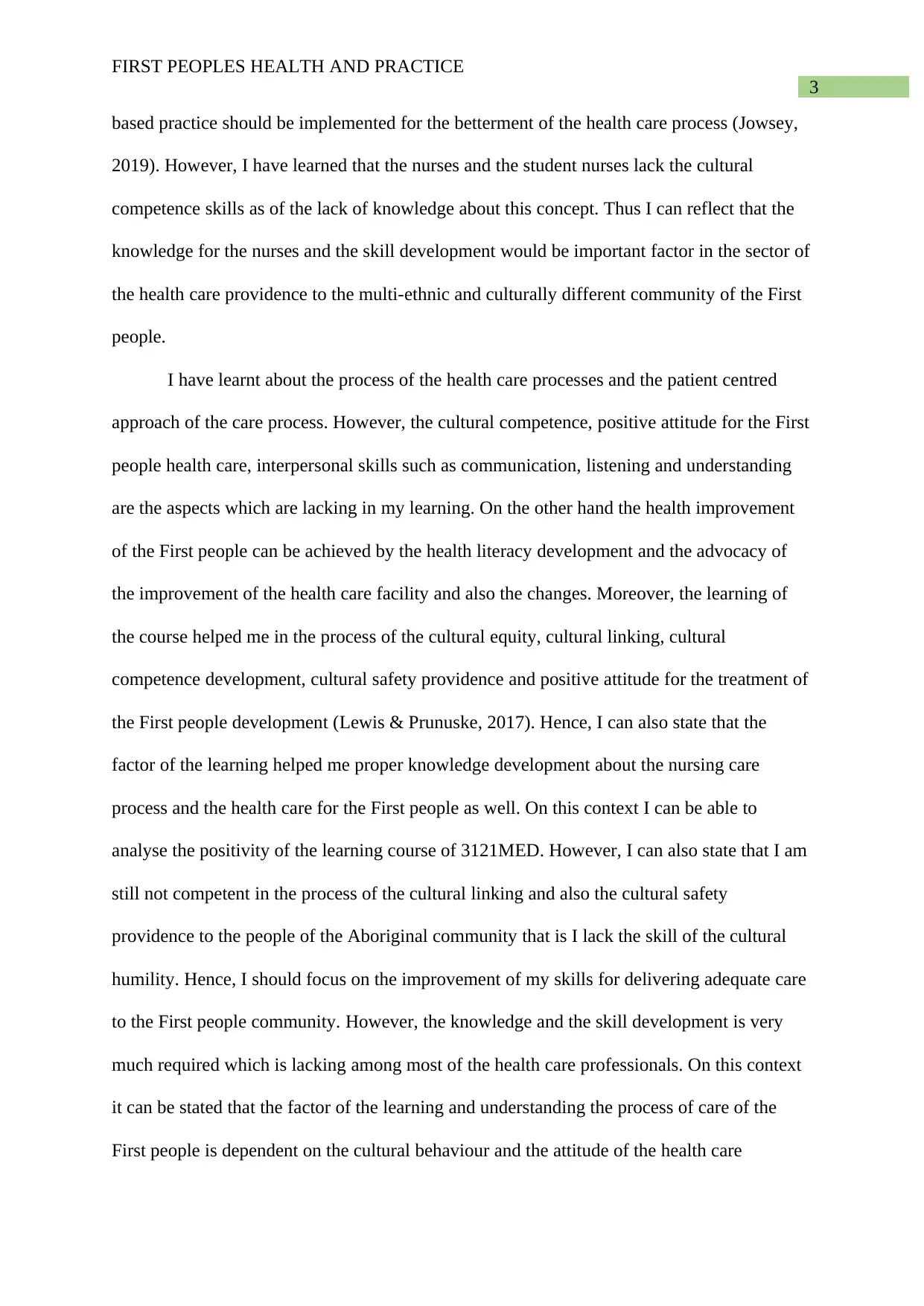
3
FIRST PEOPLES HEALTH AND PRACTICE
based practice should be implemented for the betterment of the health care process (Jowsey,
2019). However, I have learned that the nurses and the student nurses lack the cultural
competence skills as of the lack of knowledge about this concept. Thus I can reflect that the
knowledge for the nurses and the skill development would be important factor in the sector of
the health care providence to the multi-ethnic and culturally different community of the First
people.
I have learnt about the process of the health care processes and the patient centred
approach of the care process. However, the cultural competence, positive attitude for the First
people health care, interpersonal skills such as communication, listening and understanding
are the aspects which are lacking in my learning. On the other hand the health improvement
of the First people can be achieved by the health literacy development and the advocacy of
the improvement of the health care facility and also the changes. Moreover, the learning of
the course helped me in the process of the cultural equity, cultural linking, cultural
competence development, cultural safety providence and positive attitude for the treatment of
the First people development (Lewis & Prunuske, 2017). Hence, I can also state that the
factor of the learning helped me proper knowledge development about the nursing care
process and the health care for the First people as well. On this context I can be able to
analyse the positivity of the learning course of 3121MED. However, I can also state that I am
still not competent in the process of the cultural linking and also the cultural safety
providence to the people of the Aboriginal community that is I lack the skill of the cultural
humility. Hence, I should focus on the improvement of my skills for delivering adequate care
to the First people community. However, the knowledge and the skill development is very
much required which is lacking among most of the health care professionals. On this context
it can be stated that the factor of the learning and understanding the process of care of the
First people is dependent on the cultural behaviour and the attitude of the health care
FIRST PEOPLES HEALTH AND PRACTICE
based practice should be implemented for the betterment of the health care process (Jowsey,
2019). However, I have learned that the nurses and the student nurses lack the cultural
competence skills as of the lack of knowledge about this concept. Thus I can reflect that the
knowledge for the nurses and the skill development would be important factor in the sector of
the health care providence to the multi-ethnic and culturally different community of the First
people.
I have learnt about the process of the health care processes and the patient centred
approach of the care process. However, the cultural competence, positive attitude for the First
people health care, interpersonal skills such as communication, listening and understanding
are the aspects which are lacking in my learning. On the other hand the health improvement
of the First people can be achieved by the health literacy development and the advocacy of
the improvement of the health care facility and also the changes. Moreover, the learning of
the course helped me in the process of the cultural equity, cultural linking, cultural
competence development, cultural safety providence and positive attitude for the treatment of
the First people development (Lewis & Prunuske, 2017). Hence, I can also state that the
factor of the learning helped me proper knowledge development about the nursing care
process and the health care for the First people as well. On this context I can be able to
analyse the positivity of the learning course of 3121MED. However, I can also state that I am
still not competent in the process of the cultural linking and also the cultural safety
providence to the people of the Aboriginal community that is I lack the skill of the cultural
humility. Hence, I should focus on the improvement of my skills for delivering adequate care
to the First people community. However, the knowledge and the skill development is very
much required which is lacking among most of the health care professionals. On this context
it can be stated that the factor of the learning and understanding the process of care of the
First people is dependent on the cultural behaviour and the attitude of the health care
Paraphrase This Document
Need a fresh take? Get an instant paraphrase of this document with our AI Paraphraser
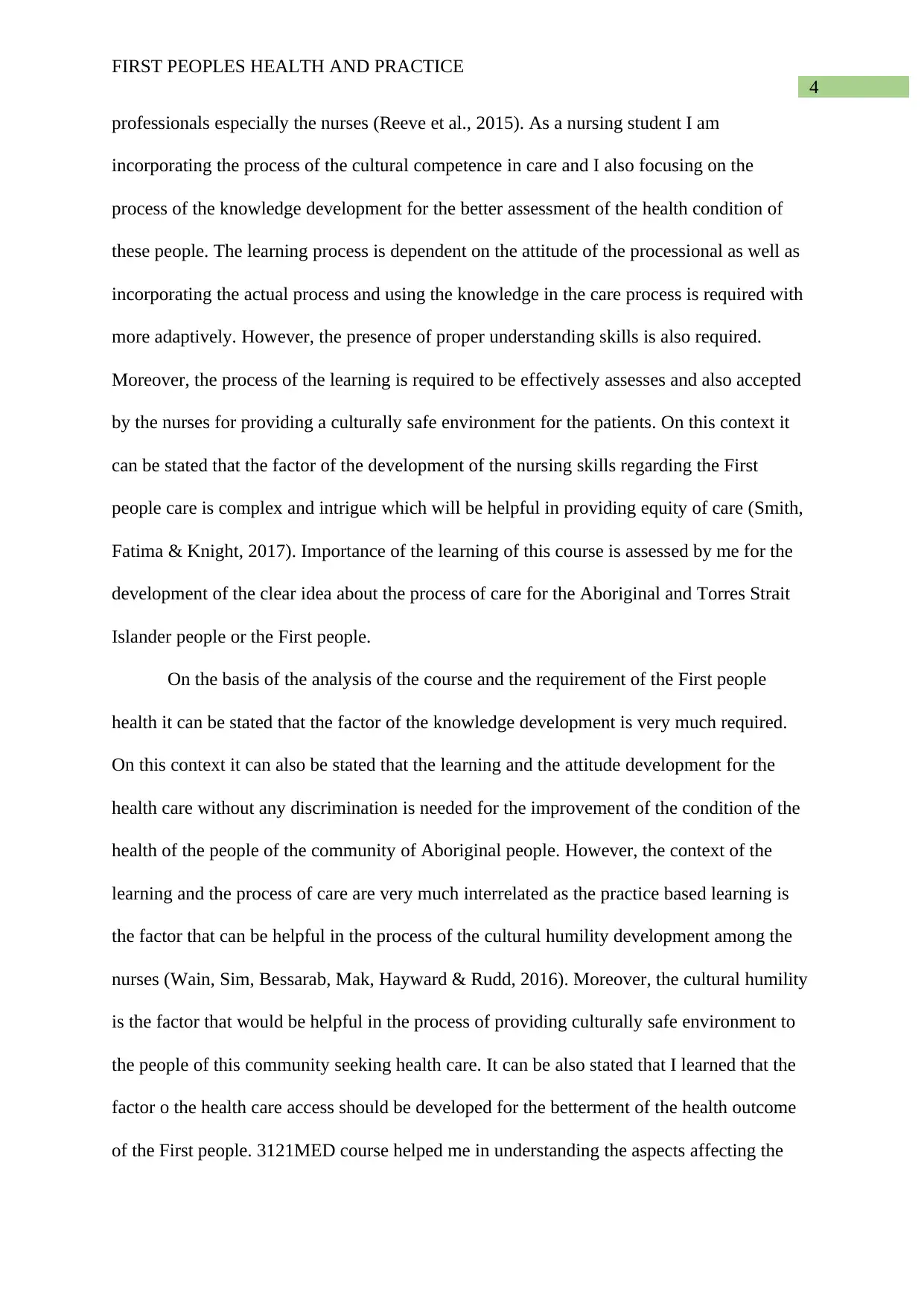
4
FIRST PEOPLES HEALTH AND PRACTICE
professionals especially the nurses (Reeve et al., 2015). As a nursing student I am
incorporating the process of the cultural competence in care and I also focusing on the
process of the knowledge development for the better assessment of the health condition of
these people. The learning process is dependent on the attitude of the processional as well as
incorporating the actual process and using the knowledge in the care process is required with
more adaptively. However, the presence of proper understanding skills is also required.
Moreover, the process of the learning is required to be effectively assesses and also accepted
by the nurses for providing a culturally safe environment for the patients. On this context it
can be stated that the factor of the development of the nursing skills regarding the First
people care is complex and intrigue which will be helpful in providing equity of care (Smith,
Fatima & Knight, 2017). Importance of the learning of this course is assessed by me for the
development of the clear idea about the process of care for the Aboriginal and Torres Strait
Islander people or the First people.
On the basis of the analysis of the course and the requirement of the First people
health it can be stated that the factor of the knowledge development is very much required.
On this context it can also be stated that the learning and the attitude development for the
health care without any discrimination is needed for the improvement of the condition of the
health of the people of the community of Aboriginal people. However, the context of the
learning and the process of care are very much interrelated as the practice based learning is
the factor that can be helpful in the process of the cultural humility development among the
nurses (Wain, Sim, Bessarab, Mak, Hayward & Rudd, 2016). Moreover, the cultural humility
is the factor that would be helpful in the process of providing culturally safe environment to
the people of this community seeking health care. It can be also stated that I learned that the
factor o the health care access should be developed for the betterment of the health outcome
of the First people. 3121MED course helped me in understanding the aspects affecting the
FIRST PEOPLES HEALTH AND PRACTICE
professionals especially the nurses (Reeve et al., 2015). As a nursing student I am
incorporating the process of the cultural competence in care and I also focusing on the
process of the knowledge development for the better assessment of the health condition of
these people. The learning process is dependent on the attitude of the processional as well as
incorporating the actual process and using the knowledge in the care process is required with
more adaptively. However, the presence of proper understanding skills is also required.
Moreover, the process of the learning is required to be effectively assesses and also accepted
by the nurses for providing a culturally safe environment for the patients. On this context it
can be stated that the factor of the development of the nursing skills regarding the First
people care is complex and intrigue which will be helpful in providing equity of care (Smith,
Fatima & Knight, 2017). Importance of the learning of this course is assessed by me for the
development of the clear idea about the process of care for the Aboriginal and Torres Strait
Islander people or the First people.
On the basis of the analysis of the course and the requirement of the First people
health it can be stated that the factor of the knowledge development is very much required.
On this context it can also be stated that the learning and the attitude development for the
health care without any discrimination is needed for the improvement of the condition of the
health of the people of the community of Aboriginal people. However, the context of the
learning and the process of care are very much interrelated as the practice based learning is
the factor that can be helpful in the process of the cultural humility development among the
nurses (Wain, Sim, Bessarab, Mak, Hayward & Rudd, 2016). Moreover, the cultural humility
is the factor that would be helpful in the process of providing culturally safe environment to
the people of this community seeking health care. It can be also stated that I learned that the
factor o the health care access should be developed for the betterment of the health outcome
of the First people. 3121MED course helped me in understanding the aspects affecting the
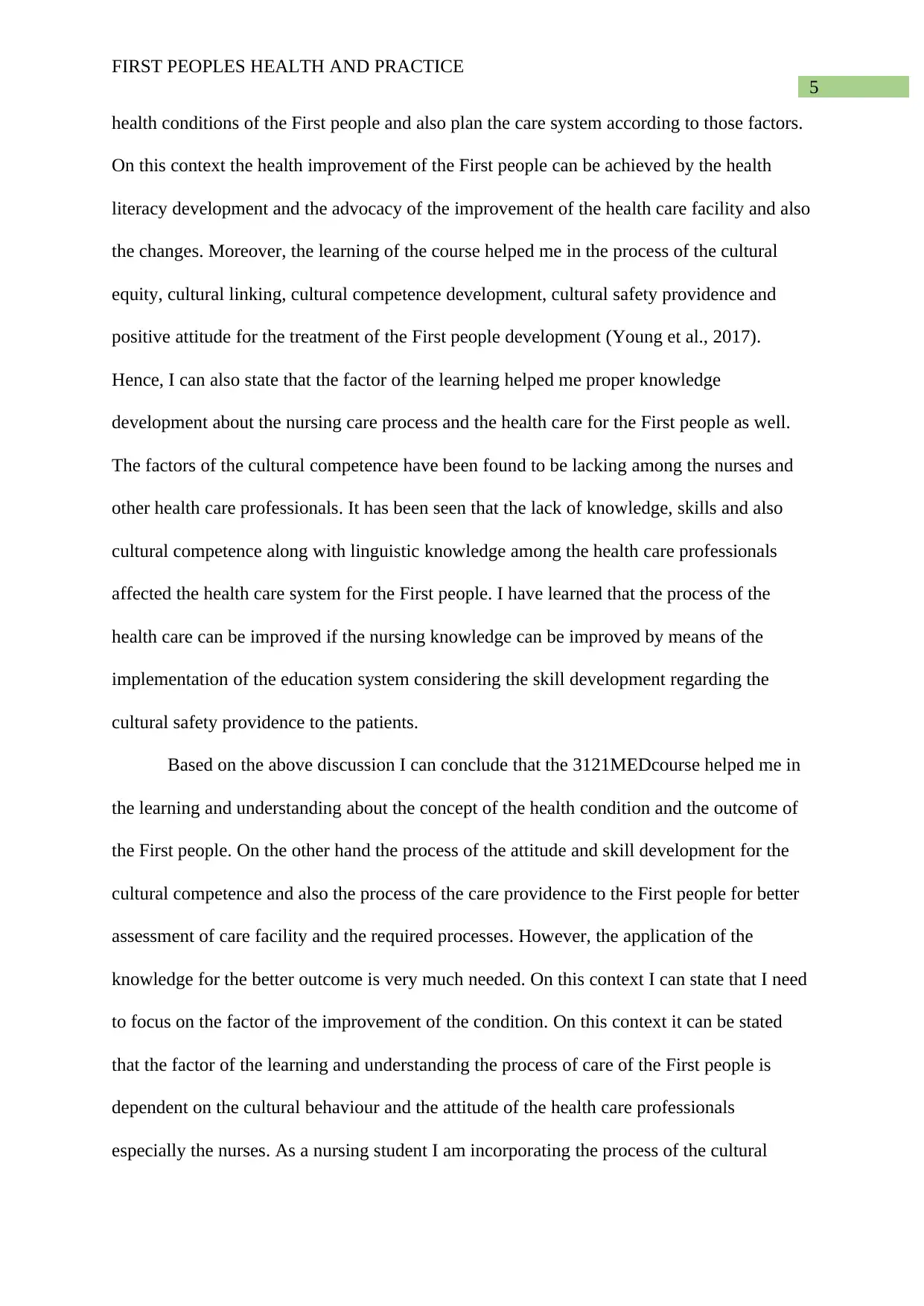
5
FIRST PEOPLES HEALTH AND PRACTICE
health conditions of the First people and also plan the care system according to those factors.
On this context the health improvement of the First people can be achieved by the health
literacy development and the advocacy of the improvement of the health care facility and also
the changes. Moreover, the learning of the course helped me in the process of the cultural
equity, cultural linking, cultural competence development, cultural safety providence and
positive attitude for the treatment of the First people development (Young et al., 2017).
Hence, I can also state that the factor of the learning helped me proper knowledge
development about the nursing care process and the health care for the First people as well.
The factors of the cultural competence have been found to be lacking among the nurses and
other health care professionals. It has been seen that the lack of knowledge, skills and also
cultural competence along with linguistic knowledge among the health care professionals
affected the health care system for the First people. I have learned that the process of the
health care can be improved if the nursing knowledge can be improved by means of the
implementation of the education system considering the skill development regarding the
cultural safety providence to the patients.
Based on the above discussion I can conclude that the 3121MEDcourse helped me in
the learning and understanding about the concept of the health condition and the outcome of
the First people. On the other hand the process of the attitude and skill development for the
cultural competence and also the process of the care providence to the First people for better
assessment of care facility and the required processes. However, the application of the
knowledge for the better outcome is very much needed. On this context I can state that I need
to focus on the factor of the improvement of the condition. On this context it can be stated
that the factor of the learning and understanding the process of care of the First people is
dependent on the cultural behaviour and the attitude of the health care professionals
especially the nurses. As a nursing student I am incorporating the process of the cultural
FIRST PEOPLES HEALTH AND PRACTICE
health conditions of the First people and also plan the care system according to those factors.
On this context the health improvement of the First people can be achieved by the health
literacy development and the advocacy of the improvement of the health care facility and also
the changes. Moreover, the learning of the course helped me in the process of the cultural
equity, cultural linking, cultural competence development, cultural safety providence and
positive attitude for the treatment of the First people development (Young et al., 2017).
Hence, I can also state that the factor of the learning helped me proper knowledge
development about the nursing care process and the health care for the First people as well.
The factors of the cultural competence have been found to be lacking among the nurses and
other health care professionals. It has been seen that the lack of knowledge, skills and also
cultural competence along with linguistic knowledge among the health care professionals
affected the health care system for the First people. I have learned that the process of the
health care can be improved if the nursing knowledge can be improved by means of the
implementation of the education system considering the skill development regarding the
cultural safety providence to the patients.
Based on the above discussion I can conclude that the 3121MEDcourse helped me in
the learning and understanding about the concept of the health condition and the outcome of
the First people. On the other hand the process of the attitude and skill development for the
cultural competence and also the process of the care providence to the First people for better
assessment of care facility and the required processes. However, the application of the
knowledge for the better outcome is very much needed. On this context I can state that I need
to focus on the factor of the improvement of the condition. On this context it can be stated
that the factor of the learning and understanding the process of care of the First people is
dependent on the cultural behaviour and the attitude of the health care professionals
especially the nurses. As a nursing student I am incorporating the process of the cultural
⊘ This is a preview!⊘
Do you want full access?
Subscribe today to unlock all pages.

Trusted by 1+ million students worldwide
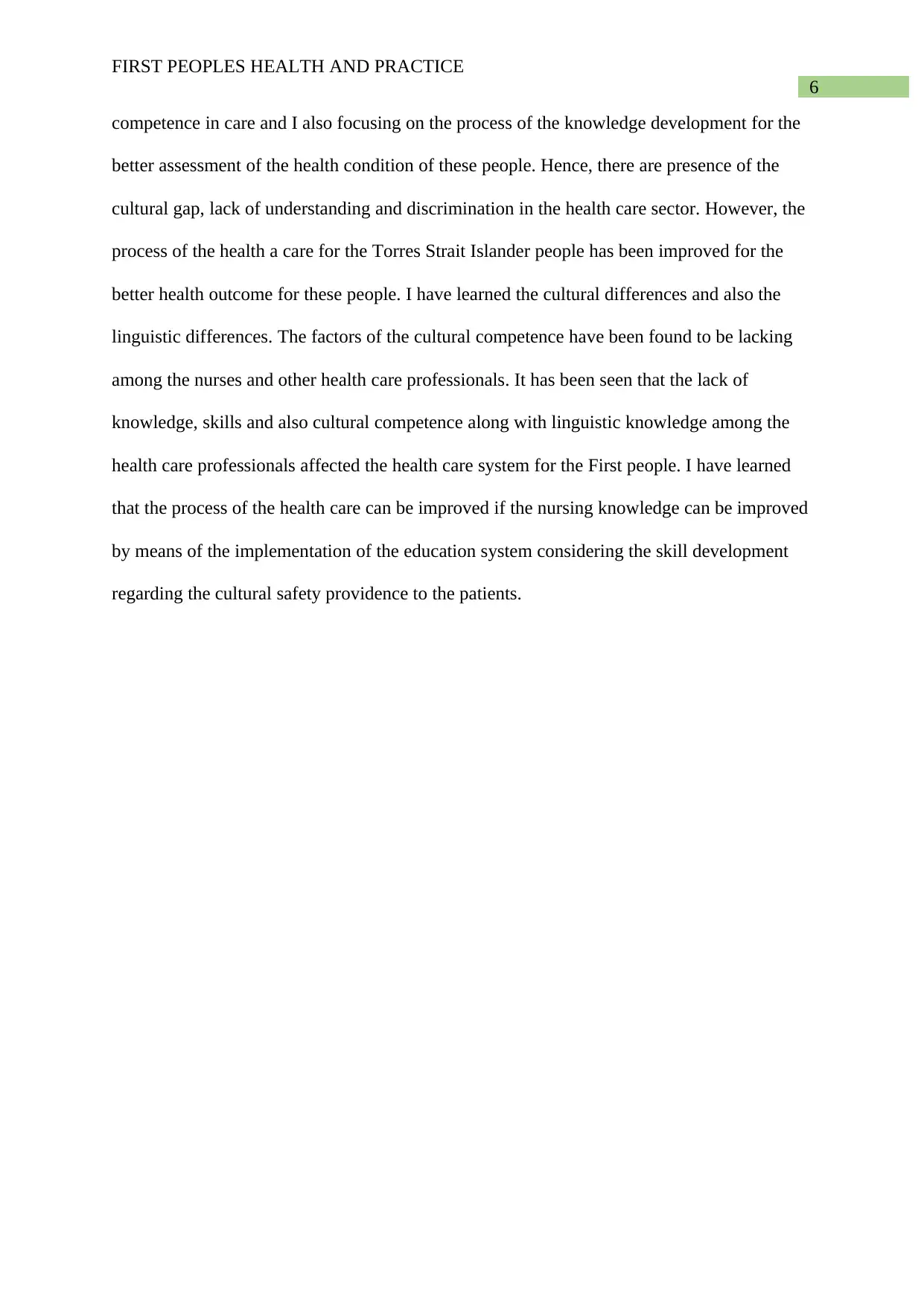
6
FIRST PEOPLES HEALTH AND PRACTICE
competence in care and I also focusing on the process of the knowledge development for the
better assessment of the health condition of these people. Hence, there are presence of the
cultural gap, lack of understanding and discrimination in the health care sector. However, the
process of the health a care for the Torres Strait Islander people has been improved for the
better health outcome for these people. I have learned the cultural differences and also the
linguistic differences. The factors of the cultural competence have been found to be lacking
among the nurses and other health care professionals. It has been seen that the lack of
knowledge, skills and also cultural competence along with linguistic knowledge among the
health care professionals affected the health care system for the First people. I have learned
that the process of the health care can be improved if the nursing knowledge can be improved
by means of the implementation of the education system considering the skill development
regarding the cultural safety providence to the patients.
FIRST PEOPLES HEALTH AND PRACTICE
competence in care and I also focusing on the process of the knowledge development for the
better assessment of the health condition of these people. Hence, there are presence of the
cultural gap, lack of understanding and discrimination in the health care sector. However, the
process of the health a care for the Torres Strait Islander people has been improved for the
better health outcome for these people. I have learned the cultural differences and also the
linguistic differences. The factors of the cultural competence have been found to be lacking
among the nurses and other health care professionals. It has been seen that the lack of
knowledge, skills and also cultural competence along with linguistic knowledge among the
health care professionals affected the health care system for the First people. I have learned
that the process of the health care can be improved if the nursing knowledge can be improved
by means of the implementation of the education system considering the skill development
regarding the cultural safety providence to the patients.
Paraphrase This Document
Need a fresh take? Get an instant paraphrase of this document with our AI Paraphraser
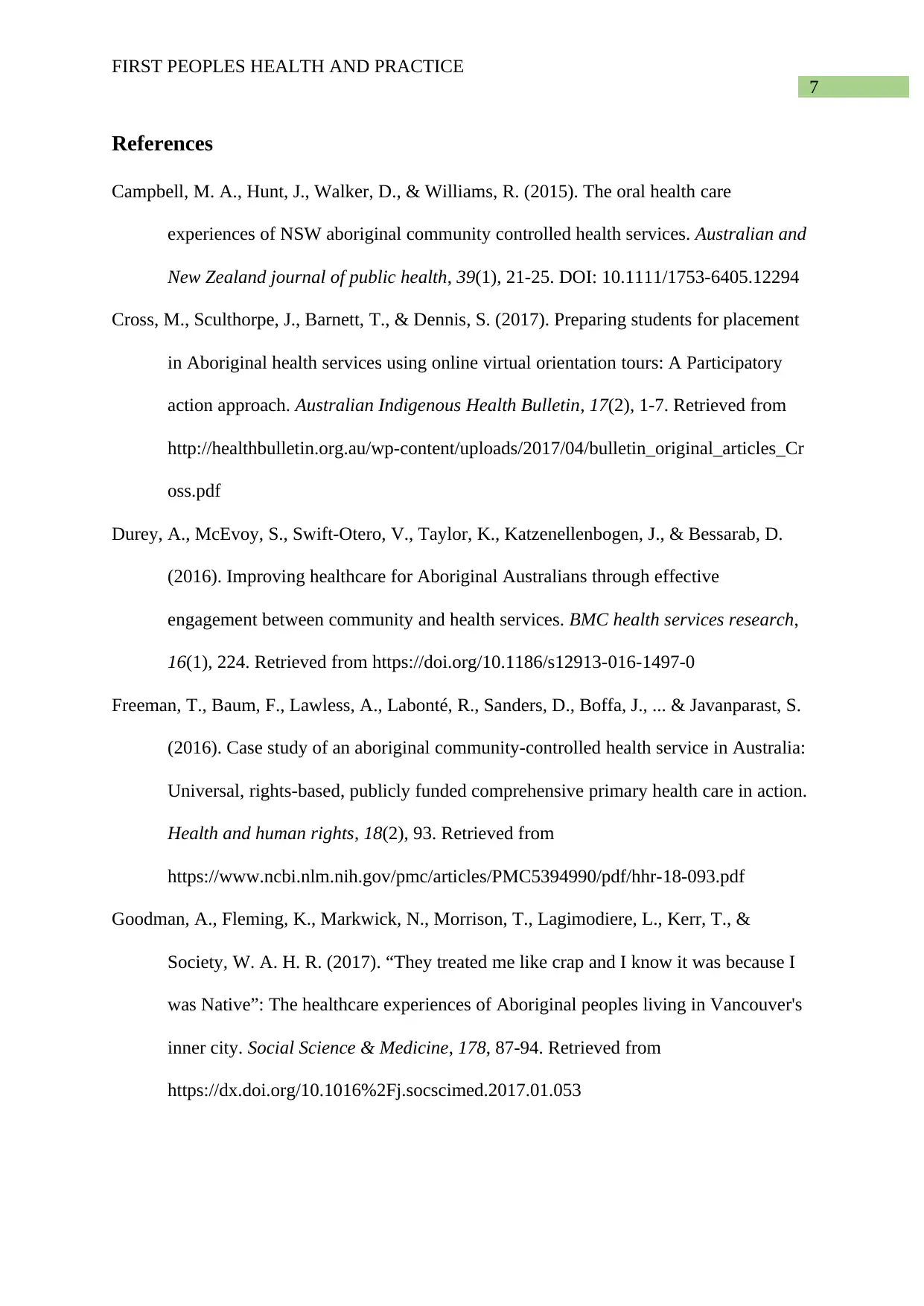
7
FIRST PEOPLES HEALTH AND PRACTICE
References
Campbell, M. A., Hunt, J., Walker, D., & Williams, R. (2015). The oral health care
experiences of NSW aboriginal community controlled health services. Australian and
New Zealand journal of public health, 39(1), 21-25. DOI: 10.1111/1753-6405.12294
Cross, M., Sculthorpe, J., Barnett, T., & Dennis, S. (2017). Preparing students for placement
in Aboriginal health services using online virtual orientation tours: A Participatory
action approach. Australian Indigenous Health Bulletin, 17(2), 1-7. Retrieved from
http://healthbulletin.org.au/wp-content/uploads/2017/04/bulletin_original_articles_Cr
oss.pdf
Durey, A., McEvoy, S., Swift-Otero, V., Taylor, K., Katzenellenbogen, J., & Bessarab, D.
(2016). Improving healthcare for Aboriginal Australians through effective
engagement between community and health services. BMC health services research,
16(1), 224. Retrieved from https://doi.org/10.1186/s12913-016-1497-0
Freeman, T., Baum, F., Lawless, A., Labonté, R., Sanders, D., Boffa, J., ... & Javanparast, S.
(2016). Case study of an aboriginal community-controlled health service in Australia:
Universal, rights-based, publicly funded comprehensive primary health care in action.
Health and human rights, 18(2), 93. Retrieved from
https://www.ncbi.nlm.nih.gov/pmc/articles/PMC5394990/pdf/hhr-18-093.pdf
Goodman, A., Fleming, K., Markwick, N., Morrison, T., Lagimodiere, L., Kerr, T., &
Society, W. A. H. R. (2017). “They treated me like crap and I know it was because I
was Native”: The healthcare experiences of Aboriginal peoples living in Vancouver's
inner city. Social Science & Medicine, 178, 87-94. Retrieved from
https://dx.doi.org/10.1016%2Fj.socscimed.2017.01.053
FIRST PEOPLES HEALTH AND PRACTICE
References
Campbell, M. A., Hunt, J., Walker, D., & Williams, R. (2015). The oral health care
experiences of NSW aboriginal community controlled health services. Australian and
New Zealand journal of public health, 39(1), 21-25. DOI: 10.1111/1753-6405.12294
Cross, M., Sculthorpe, J., Barnett, T., & Dennis, S. (2017). Preparing students for placement
in Aboriginal health services using online virtual orientation tours: A Participatory
action approach. Australian Indigenous Health Bulletin, 17(2), 1-7. Retrieved from
http://healthbulletin.org.au/wp-content/uploads/2017/04/bulletin_original_articles_Cr
oss.pdf
Durey, A., McEvoy, S., Swift-Otero, V., Taylor, K., Katzenellenbogen, J., & Bessarab, D.
(2016). Improving healthcare for Aboriginal Australians through effective
engagement between community and health services. BMC health services research,
16(1), 224. Retrieved from https://doi.org/10.1186/s12913-016-1497-0
Freeman, T., Baum, F., Lawless, A., Labonté, R., Sanders, D., Boffa, J., ... & Javanparast, S.
(2016). Case study of an aboriginal community-controlled health service in Australia:
Universal, rights-based, publicly funded comprehensive primary health care in action.
Health and human rights, 18(2), 93. Retrieved from
https://www.ncbi.nlm.nih.gov/pmc/articles/PMC5394990/pdf/hhr-18-093.pdf
Goodman, A., Fleming, K., Markwick, N., Morrison, T., Lagimodiere, L., Kerr, T., &
Society, W. A. H. R. (2017). “They treated me like crap and I know it was because I
was Native”: The healthcare experiences of Aboriginal peoples living in Vancouver's
inner city. Social Science & Medicine, 178, 87-94. Retrieved from
https://dx.doi.org/10.1016%2Fj.socscimed.2017.01.053
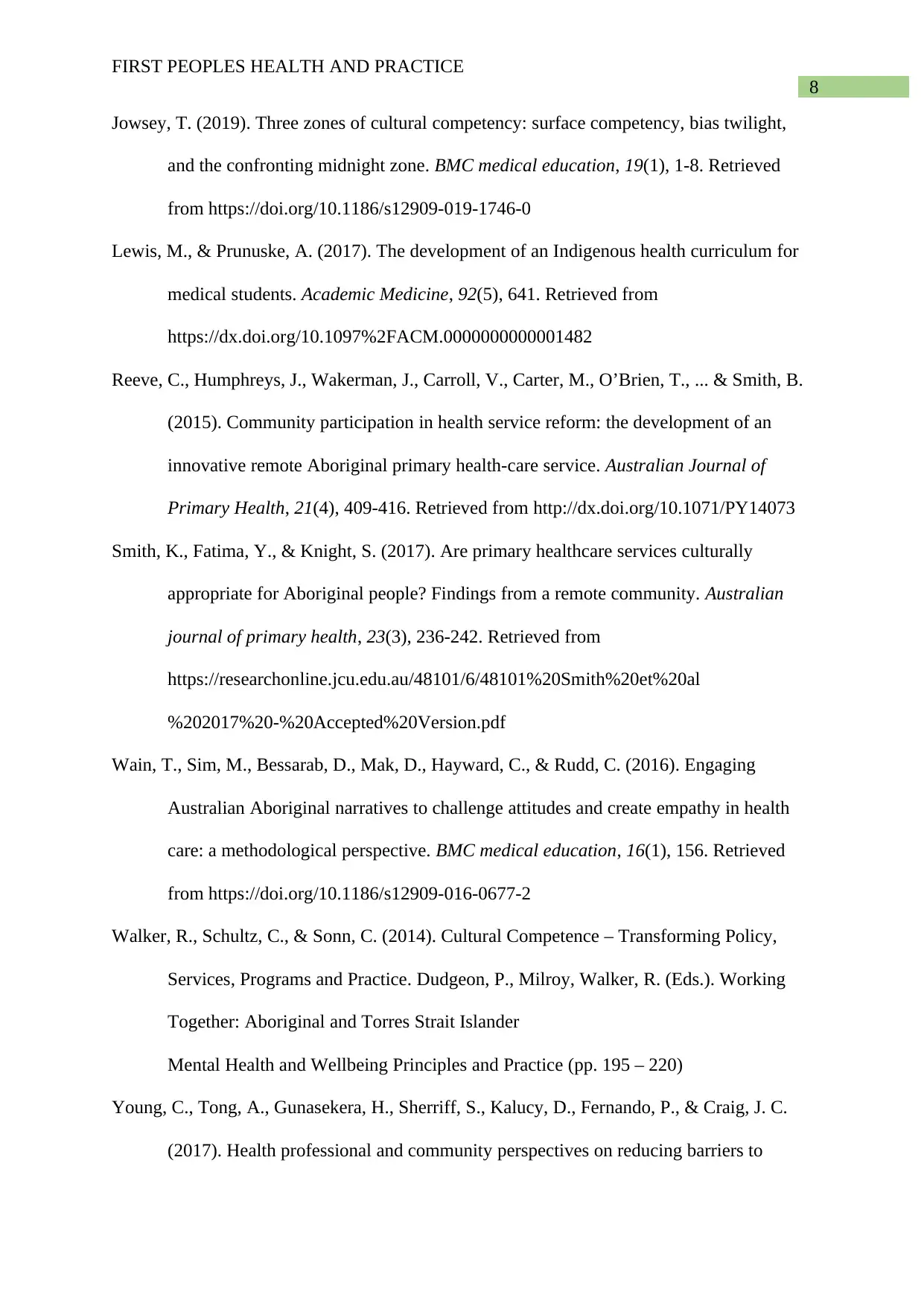
8
FIRST PEOPLES HEALTH AND PRACTICE
Jowsey, T. (2019). Three zones of cultural competency: surface competency, bias twilight,
and the confronting midnight zone. BMC medical education, 19(1), 1-8. Retrieved
from https://doi.org/10.1186/s12909-019-1746-0
Lewis, M., & Prunuske, A. (2017). The development of an Indigenous health curriculum for
medical students. Academic Medicine, 92(5), 641. Retrieved from
https://dx.doi.org/10.1097%2FACM.0000000000001482
Reeve, C., Humphreys, J., Wakerman, J., Carroll, V., Carter, M., O’Brien, T., ... & Smith, B.
(2015). Community participation in health service reform: the development of an
innovative remote Aboriginal primary health-care service. Australian Journal of
Primary Health, 21(4), 409-416. Retrieved from http://dx.doi.org/10.1071/PY14073
Smith, K., Fatima, Y., & Knight, S. (2017). Are primary healthcare services culturally
appropriate for Aboriginal people? Findings from a remote community. Australian
journal of primary health, 23(3), 236-242. Retrieved from
https://researchonline.jcu.edu.au/48101/6/48101%20Smith%20et%20al
%202017%20-%20Accepted%20Version.pdf
Wain, T., Sim, M., Bessarab, D., Mak, D., Hayward, C., & Rudd, C. (2016). Engaging
Australian Aboriginal narratives to challenge attitudes and create empathy in health
care: a methodological perspective. BMC medical education, 16(1), 156. Retrieved
from https://doi.org/10.1186/s12909-016-0677-2
Walker, R., Schultz, C., & Sonn, C. (2014). Cultural Competence – Transforming Policy,
Services, Programs and Practice. Dudgeon, P., Milroy, Walker, R. (Eds.). Working
Together: Aboriginal and Torres Strait Islander
Mental Health and Wellbeing Principles and Practice (pp. 195 – 220)
Young, C., Tong, A., Gunasekera, H., Sherriff, S., Kalucy, D., Fernando, P., & Craig, J. C.
(2017). Health professional and community perspectives on reducing barriers to
FIRST PEOPLES HEALTH AND PRACTICE
Jowsey, T. (2019). Three zones of cultural competency: surface competency, bias twilight,
and the confronting midnight zone. BMC medical education, 19(1), 1-8. Retrieved
from https://doi.org/10.1186/s12909-019-1746-0
Lewis, M., & Prunuske, A. (2017). The development of an Indigenous health curriculum for
medical students. Academic Medicine, 92(5), 641. Retrieved from
https://dx.doi.org/10.1097%2FACM.0000000000001482
Reeve, C., Humphreys, J., Wakerman, J., Carroll, V., Carter, M., O’Brien, T., ... & Smith, B.
(2015). Community participation in health service reform: the development of an
innovative remote Aboriginal primary health-care service. Australian Journal of
Primary Health, 21(4), 409-416. Retrieved from http://dx.doi.org/10.1071/PY14073
Smith, K., Fatima, Y., & Knight, S. (2017). Are primary healthcare services culturally
appropriate for Aboriginal people? Findings from a remote community. Australian
journal of primary health, 23(3), 236-242. Retrieved from
https://researchonline.jcu.edu.au/48101/6/48101%20Smith%20et%20al
%202017%20-%20Accepted%20Version.pdf
Wain, T., Sim, M., Bessarab, D., Mak, D., Hayward, C., & Rudd, C. (2016). Engaging
Australian Aboriginal narratives to challenge attitudes and create empathy in health
care: a methodological perspective. BMC medical education, 16(1), 156. Retrieved
from https://doi.org/10.1186/s12909-016-0677-2
Walker, R., Schultz, C., & Sonn, C. (2014). Cultural Competence – Transforming Policy,
Services, Programs and Practice. Dudgeon, P., Milroy, Walker, R. (Eds.). Working
Together: Aboriginal and Torres Strait Islander
Mental Health and Wellbeing Principles and Practice (pp. 195 – 220)
Young, C., Tong, A., Gunasekera, H., Sherriff, S., Kalucy, D., Fernando, P., & Craig, J. C.
(2017). Health professional and community perspectives on reducing barriers to
⊘ This is a preview!⊘
Do you want full access?
Subscribe today to unlock all pages.

Trusted by 1+ million students worldwide
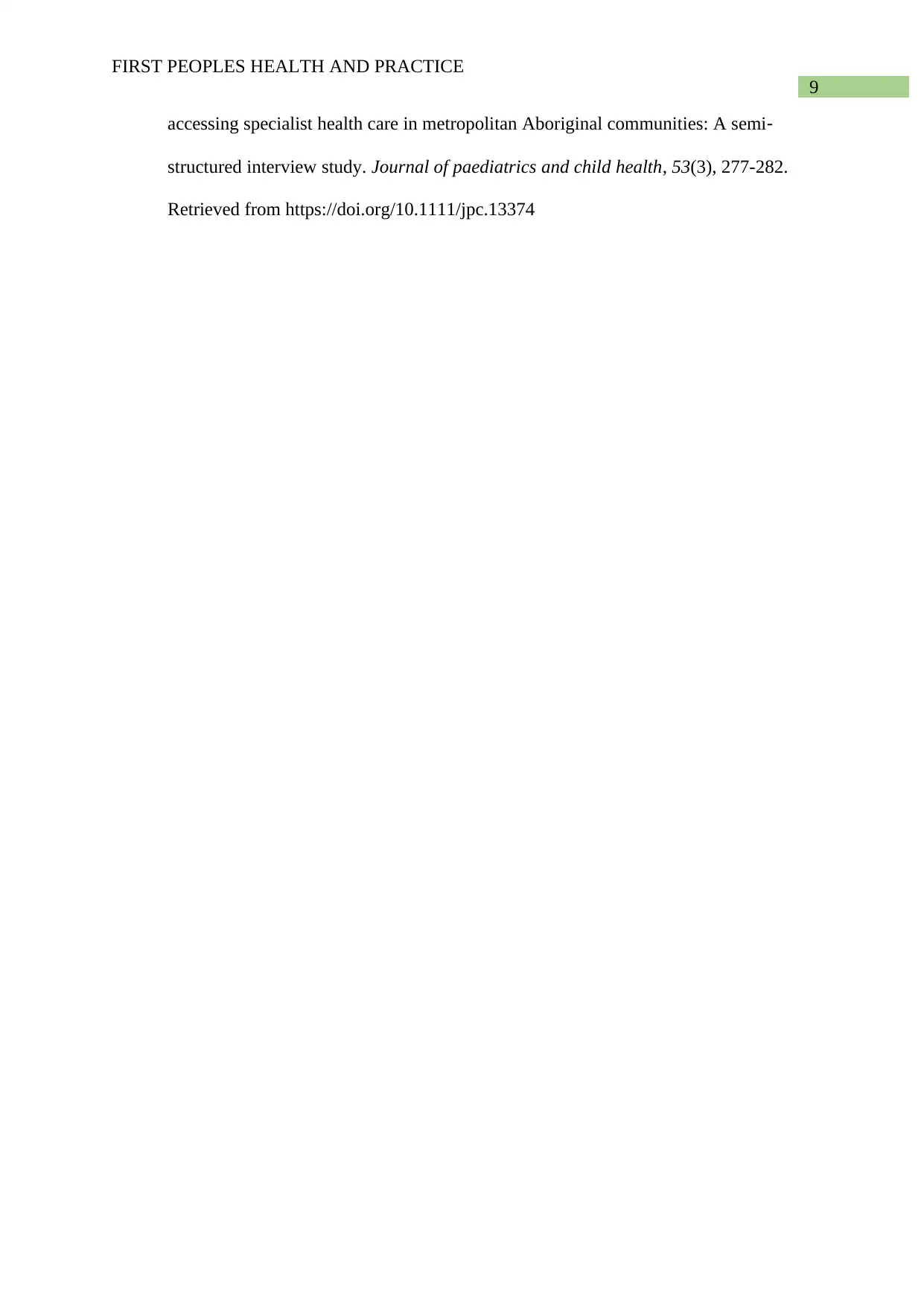
9
FIRST PEOPLES HEALTH AND PRACTICE
accessing specialist health care in metropolitan Aboriginal communities: A semi‐
structured interview study. Journal of paediatrics and child health, 53(3), 277-282.
Retrieved from https://doi.org/10.1111/jpc.13374
FIRST PEOPLES HEALTH AND PRACTICE
accessing specialist health care in metropolitan Aboriginal communities: A semi‐
structured interview study. Journal of paediatrics and child health, 53(3), 277-282.
Retrieved from https://doi.org/10.1111/jpc.13374
1 out of 10
Related Documents
Your All-in-One AI-Powered Toolkit for Academic Success.
+13062052269
info@desklib.com
Available 24*7 on WhatsApp / Email
![[object Object]](/_next/static/media/star-bottom.7253800d.svg)
Unlock your academic potential
Copyright © 2020–2026 A2Z Services. All Rights Reserved. Developed and managed by ZUCOL.





